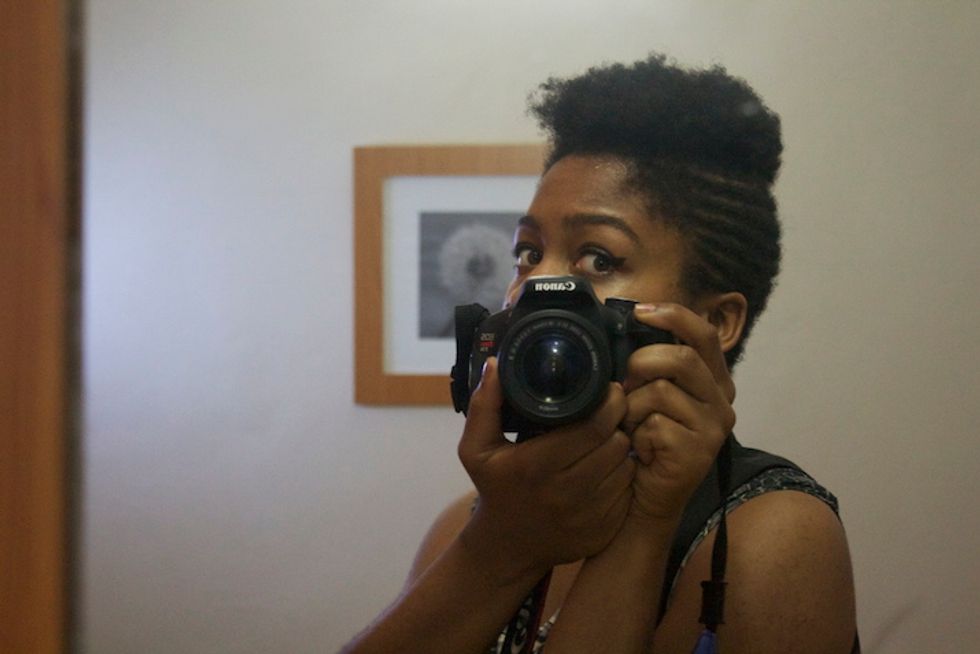A First-Generation Nigerian-American Explores Her Identity In 'Summer In Igboland'
Ifeanyi Awachie's diary-travel blog hybrid 'Summer in Igboland' is filled with vivid recollections of family, food, hair, music and dance.

For 19 years, writer Ifeanyi Awachie had a difficult time answering a simple question: "Where are you from?"
She was born in Nigeria, raised in California and Georgia, and yet, none of those locations seemed like an appropriate response. It wasn't until her first trip back to Nigeria for a Yale summer fellowship in 2013 that Awachie was able to start piecing one together.
"The way I articulate answers to the question 'Where are you from?' has changed—I can say, 'I was born in Nsukka' or 'my family’s from Umunnachi' and actually invoke those places in my mind," she told Okayafrica in an email interview. "Before, I felt like a fraud, naming places I couldn’t have described in any further detail."
Published earlier this summer, Awachie's photodocumentary ebook Summer in Igboland is filled with similarly revealing moments and steeped in nuanced recollections and vivid images of family, food, hair and music. Dance also plays a big role in the author's self-identification process. In a chapter titled "Rhythm Is Genetic," she writes:
“We head to the club, Orange Room on Bisala Road, for a night of dancing. On the drive over, I get nervous. I can dance—in the States, I’m always in the center of the dancefloor, usually surrounded by non-black friends who copy my moves—but I’m in Africa right now, the birthplace of rhythm. I dance hesitantly, expecting everyone at the club to bust effortlessly superior moves, but the DJ plays hip hop, and the other clubbers are decent dancers, but I’m the expert. When it gets late and the set shifts to afrobeat, I feel confident enough to summon up the dance moves I know from Nigerian community parties in Atlanta and invent more. “Where did you learn to dance?” one of Nkem’s friends asks me, bending close to be heard above an azonto track. He means that I couldn’t have learned to dance like a Nigerian in America, but I haven’t lived in Nigeria long enough to learn here, either. I could yell what I suspect, which is that rhythm is genetic, but instead I shrug, happy that my moves speak for themselves.”
Certain snapshots buoy to the surface, like that of the author's newfound love of fufu, while others plunge to bittersweet depths. In a chapter titled "Munachi," Awachie grapples with her long-distance relationship with her extended family as her young cousin lies on her chest:
“ON AN EVENING IN LAGOS, I sit in an armchair with my two year-old cousin Munachiso lying on my chest, thinking about how long it’s been since I last hung out with a baby. My siblings and younger family friends have all grown up, and no one back home is having kids anytime soon. I nestle my fingers in Munachi’s hair, his brown curls soft and diffuse as if windblown. As he grows older, they will become coarse, African. If you asked me right now, I would say childhoods in Nigeria are for loss. Someone held me the way I hold Munachi nineteen years ago, someone that I no longer remember. I imagine introducing myself to Munachi nineteen years in his future, a strange cousin from America that he has to call 'Auntie' reminding him that she’d loved making funny faces at him when he was two, that he used to lie on her chest. I will try to win his affection, and he will respond with a shy smile, blank with lack of memory, slightly apologetic, the same expression I have given so many of my parents’ old friends as they pass through our house in Atlanta and as I accept I will do on this trip. I think about how badly I want Munachi not to forget me. I plan future trips to Nigeria. I will win more fellowships. I will return soon and often. As I think about this, the maid comes and takes Munachi to bed, leaving behind the smell of milk.”
First-generation children with immediate roots in Africa, the Caribbean or Latin America will certainly catch a glimpse of themselves throughout this diary-travel blog hybrid. At the same time, Awachie wants both Nigerian locals and non-Nigerian audiences to read Summer in Igboland and gain a new appreciation for the West African nation through the eyes of an adventurous, passionate traveler.
"Before the trip, Nigeria was a dim set of associations in my mind: my parent’s stories of their childhood, highlife cassette tapes, dated images from Google searches, negative news headlines, the taste of rice and stew," Awachie writes in the book. "Going back gave me vivid experiences to call part of my life, to draw from when I talk about the country, my identity, what kinds of people I come from, and the roots of why I do what I do."
Summer in Igboland is available for purchase at Amazon, Barnes & Noble, Apple, Google Play and Kobo. Visit the Summer in Igboland Tumblr page for more photographs from Ifeanyi's time in Nigeria.

